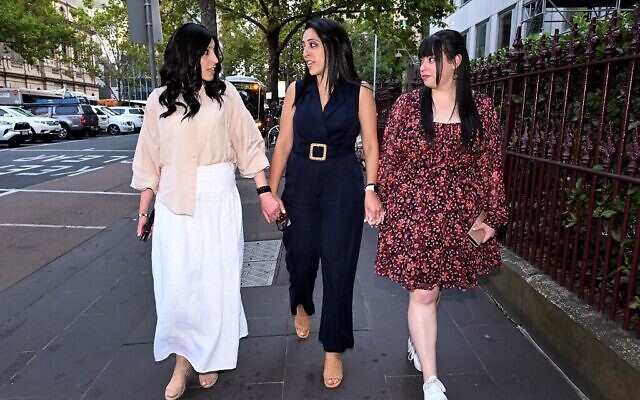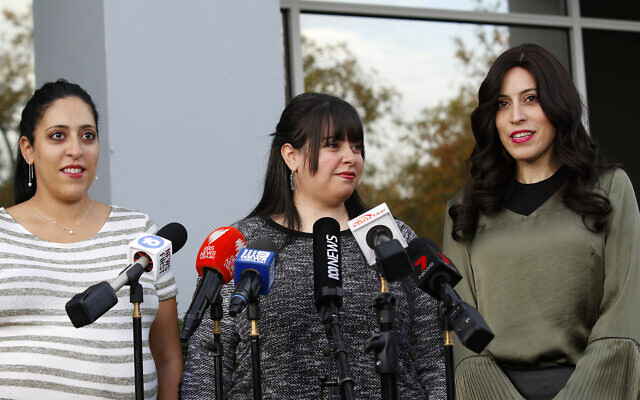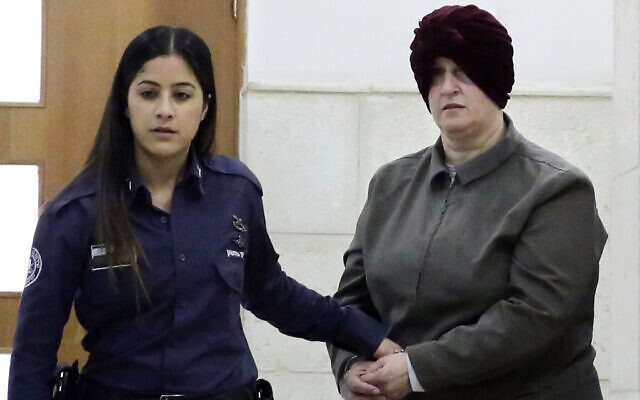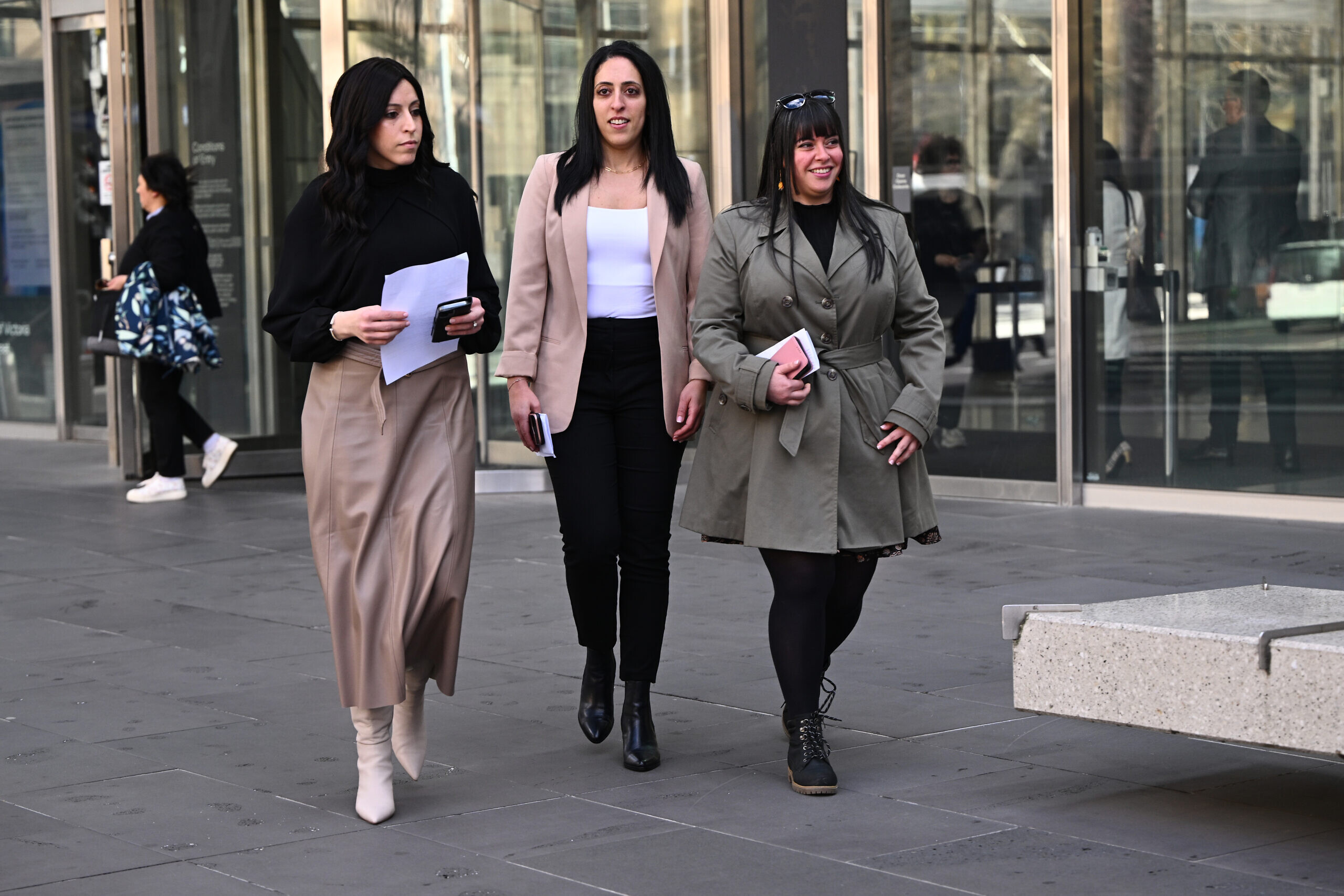“HOW do I move on in life without Malka Leifer being such a central role in it – especially after getting ‘not guilty’?”
It’s the question Nicole Meyer continues to wrestle with, while she spoke candidly with The AJN from a Melbourne hotel room, four days after the sentencing of disgraced former Adass Israel School principal, Malka Leifer.
Over the past 22 years – more than half of Meyer’s life – Leifer had been a constant; “as my teacher or principal, then, as my boss and colleague”.
“And throughout it all, she was my abuser, attempting to escape justice.”
Last Thursday, County Court Judge Mark Gamble sentenced Leifer to 15 years imprisonment for 18 sexual offences – including six counts of rape – with a non-parole period of 11.5 years. The sentence takes into account time already spent in custody, meaning she could be released in 2029.
But the indictments related only to acts committed against Meyer’s sisters, Dassi Erlich and Elly Sapper; when the jury handed down their verdict in April, they found Leifer not guilty of a further five charges of rape and sexual abuse relating to Meyer.
It was a crushing blow for three sisters who have stood united through a protracted 12-year battle for justice, encompassing an international campaign to #BringLeiferBack, lengthy court delays, extradition orders, political corruption and terse diplomatic relations between Australia and Israel.
“I’ll try not to get emotional,” pre-empts Meyer, “But for me and my sisters, because of the verdict I received … it coloured our entire journey in a way that none of us ever expected. The shock of it really changed the trajectory of our feelings of achievement and celebration.”
Reflecting on the four months that have since passed, Meyer said, “It will take time for each of us, but Elly and Dassi will now be able to close that door on this because they got justice. I didn’t. I can never close the door on it. Ever.
“How do I move on without letting her continue to be in my mind 24/7?” she grappled. “I feel like she’s beaten me, and she’s broken me. She lost against my sisters, but she won against me.”
Despite the “heartbreak” of her verdict, which when handed down, Meyer says, “physically almost knocked me out”, she remained determined to show her strength to Leifer, who was present in the courtroom.
“I turned and stared at her non-stop … I thought, stuff the room and respect for the judge, I’m going to turn my head and keep staring at her. She knew I was looking at her and she looked away, but I kept glaring. Her arrogance, even at the time of the verdict, was very obvious.”
Meyer says she heard from a reliable source that even at the sentencing Leifer was so confident she would walk away with no need to serve extra time that her bags were packed.
“For me and my sisters, because of the verdict I received … it coloured our entire journey in a way that none of us ever expected. The shock of it really changed the trajectory of our feelings of achievement and celebration.”
On being in the same physical space as Leifer, Meyer observed, “Her eyes still had that same captivating, evil power that she had when she was abusing me. It hasn’t changed. She still emanates something. There’s no part of her that looks like she understands the impact of what she did, or feels bad about it.”
Overcome by Leifer’s unapologetic demeanour, Meyer shares that while present for sentencing last week, she considered risking contempt of court to communicate with Leifer, who appeared via video link from prison.
“I had written a seven-page victim impact statement which I never had the chance to read out in court. I lost that chance to speak to her and I desperately wanted to, I think I wanted to regain some of that power.
“But I zoned out as soon as the judge said 15 years.”

The day prior to the sentencing, Meyer, Erlich and Sapper met for a coffee. Completely unsure what to expect, the sisters set their sentencing expectations low: anything more than “time served” would be good.
They reconvened over the phone later that afternoon, to prepare a media statement for the following day. Meyer was at the beach, and the conversation that ensued was the hardest two hours, she recalled.
“Because we were exhausted. We were emotional. We were adrenalised. But we reassured each other; we have to get through this. We wanted to give a strong statement.”
The next morning, Meyer awoke before dawn to exercise. Together, the sisters shared an Uber to arrive at the court by 9.30am.
“From there, it was an absolute rollercoaster,” told Meyer, recalling the Judge’s 81 pages of comments he delivered; which appeared to swing favourably to the victims, to the perpetrator, and back again.
There were two short breaks throughout the morning.
“The first one I actually couldn’t move because if anyone asked me how I am, I knew I was going to melt into a puddle.”
The second interval saw a “funny, but not so funny” bathroom break, with the prosecution and defence all awkwardly navigating each other at the basins.
Shortly after returning, Judge Gamble began talking numbers.
15 years.
“I don’t remember what happened after that. Someone who observed me said I let out a small breath, but I don’t recall anything.
“Once I came to, 15 years felt unbelievable,” said Meyer. “It felt like an absolutely massive win for survivors of abuse, because it’s a number you don’t often hear. It felt like some form of validation.”
The sisters returned to a hotel room in the city. Meyer was exhausted, but remained awake until after 3am – “just dealing with lots of different emotions”.
By the following day, the sisters’ perspectives shifted when they had time to understand the maximum penalty, sentencing and cumulation on each charge.
“When you consider the maximum for one count of rape is 25 years, and there were six charges of rape, and 12 other indictments … Yes, 15 years is good, and we appreciate it tremendously – but it’s definitely not good enough.”

The road to this outcome has been long – and the toll on the sisters immeasurable.
Meyer shares that on the morning of the day she first went to the police station to make a statement 12 years ago, she discovered she was pregnant.
“It set me up for the most horrific pregnancy.
“Because of the trauma of giving the statement, of bringing it all up again, my anxiety hit a level I’ve never experienced before.
“Every single day of the pregnancy, I was convinced my baby wouldn’t make it. Even while in labour and the nurses rolled the crib into the room in preparation. I told them to take it out.”
Thankfully, she would give birth to a beautiful and healthy baby.
“But that’s where my state of mind was at that time.”
Meyer’s decision to come forward – a few months after Erlich and Sapper – was carefully considered. At the time, she was still working alongside Leifer at Adass Israel School.
Meyer kept asking herself, “Am I brave enough to share what happened to me?
“I’m in the school. I’m teaching. I had three kids – soon to be four – within five years. My family is very young … Am I actually brave enough?”
The answer was a resounding yes.
“When you consider the maximum for one count of rape is 25 years, and there were six charges of rape, and 12 other indictments … Yes, 15 years is good, and we appreciate it tremendously – but it’s definitely not good enough.”
“I’m a decisive person, and I made up my mind. I did it to get justice, so every single bump and hurdle on the way, no matter how difficult it was, was always with that end goal in sight. That’s what continued to propel me along the way.”
Reflecting on that first police statement, Meyer says it was “so mild”. Having had such a sheltered upbringing, she says she didn’t have the language to adequately describe what she experienced – and unpack the subsequent impact.
“But thankfully, as sisters, we always supported each other. If one was down, the others rallied. We were there – and are there – for each other, always.”
Meyer is also grateful for the “unwavering” support of the broader Jewish community – “a founding support beneath us as we’ve gone along this path”.
“The messages we’ve received along the way have reassured us that even when it’s tough, we’re doing the right thing.”
Some of those messages even quietly came from members of the ultra-Orthodox community.
“It’s given me a bit of hope that these conversations will start happening a little bit more and people won’t be afraid to speak up.”
Indeed, Meyer hopes she has been an example for others in the ultra-Orthodox world, for victims silenced in shame.

“It is another reason why getting ‘not guilty’ was hard for me … I felt that I let everyone down.”
Pondering the path towards healing, Meyer says it is about not allowing herself to be silenced, or her experience invalidated.
And so her crusade for justice continues: Meyer plans to get back into the courtroom, with aspirations to study criminal law next year.
“I’d also love to go to court with survivors. As someone who’s had lived experience and can be there as a support person. I would literally do that every day because I know how traumatising court is, and how hard it is to not have support sometimes.
“To be able to fight for justice empowers me – even if I didn’t get it for myself. Being able to support others in their journey and help get perpetrators off the street to face their crimes, is worth it.
“The more we speak up and not be silenced, the harder it becomes for abusers to roam free.”
If this article brings up any issues for you, please call 1800 RESPECT (1800 737 732) – the national sexual assault, domestic and family violence counselling service.


comments